- Home
- L. Ron Hubbard
Hurricane (Stories From the Golden Age) Page 2
Hurricane (Stories From the Golden Age) Read online
Page 2
In that heavy, oppressive mustiness, Spar heard a shoe creak. In the same instant he dived for the left-hand door.
A revolver shot flaming sparks into the room. The bullet snapped through the timber over Spar’s head, showering him with sparks and dust.
He slammed the door wide open. A heavy body was in his hands. He gripped the wrists. The revolver lashed up and down as though anxious to be free. His assailant was striving to smash out Spar’s brains.
Spar hung on, rocking back and forth in the darkness. He heard running feet at his back, crossing the narrow room. He lashed out with his left fist, sent the man he held rocketing away from him. His right caught and held the revolver.
A shot barked behind him. Spar whirled to meet this new danger.
Henri!
Henri stopped and tried to take a careful aim, but his face blanched and his hand was shaking when he saw that he did not have the opportunity to shoot Spar in the back. Having missed the first time, Henri did not intend to miss the second.
They stood for a full second, facing each other across ten feet of space. Then Spar ducked to one side and brought up the recovered gun.
Henri’s shot went wild. Spar fired with a chopping motion.
Henri melted back, wilting. The gun drooped and slid out of stiffening fingers. But before he fell, Spar was conscious of a movement at his side.
His first antagonist, taking advantage of Spar’s distraction, was holding a chair on high, ready to smash down on Spar’s skull.
Spar rolled swiftly to one side and fired. The chair clattered harmlessly to the rough boards. The man stumbled and sprawled between the upturned legs, hands stretched out as though reaching for his escaping life.
But even then, Spar had no time to breathe. Footfalls came from the taproom and the door was opened by a tall, thick, black man who stood in the opening with a lordly air.
Spar was about to fire when the man raised his hand.
“No, let this be as it is. The dogs deserved it for their bungling. I am your friend.”
The black man came in. He hauled the body away from the chair and sprawled it out beside Henri’s crumpled form. Then he slapped his hands together after the fashion of Eastern monarchs and a moment later four men entered, bearing another body among them.
But this man was not dead. He was either drugged or drunk. The four threw him on the floor and stood back.
The big man flicked an imaginary speck from his starched white coat and looked at Spar. “I am Chacktar. Your identity does not concern me in the least. Henri said you were a convict, escaped from the colony. So much the better. I have a use for you. If you fail to carry out my orders, I shall turn you over to the French police here and you will go back. You do not want that, I know. Here, you men, bring this young fellow to.”
His first antagonist, taking advantage of
Spar’s distraction, was holding a chair on high,
ready to smash down on Spar’s skull.
The four began to work on the drugged man and Spar studied the fellow. He was young, obviously an American. Blond hair streamed down over his face. His well-cut clothes were torn. But for all that, the face bore marks of long standing. The stamp of dissipation was there, the jaw was weak, the eyes heavily shadowed.
After a few minutes the young fellow came to, sitting up weakly, holding his head between his hands and staring through his knees at the floor.
“Now, Monsieur Perry,” said Chacktar, “what have you to say for yourself?”
Perry shook his head as though to rid it of a fog. “Wha-What happened?”
Chacktar sent a meaning look at Spar. “You, Monsieur Perry, in your drunkenness killed these two poor, defenseless men. You know what that means. You’ll hang!”
Perry crawled to his feet and stood weaving back and forth. “Me? I . . . I what?”
“You killed these men. A good thing it sobered you up. A drunken beast you are. What will your father say? And Miss Mannering. Ah, but we must get out of here. The police have heard your shots. They will be coming, instantly.”
“I . . . I killed those . . . two?” stammered Perry.
“God take me!” bawled Chacktar. “Don’t you know?”
“No, I don’t . . . remember. Why did I do it?”
“Some quarrel. I happened in just as the last one struck you over the head with that chair.”
Spar was about to intervene when he felt a gentle hand take the revolver out of his fingers. One of the men had come up to his back. A round muzzle was pressing against his spine.
“This sailor,” said Chacktar, “saw it all. Didn’t you?”
Perry looked pleadingly at Spar. The pressure of the gun at Spar’s back grew heavier. Spar thought about the penal camps. After all, he owed this youth nothing. And any present statement was worthless.
“Yes,” said Spar.
Chacktar nodded. “Then we must go. Leave these two bodies here for the police. We must get young Perry back up to his house.”
Urged along by the gun, Spar followed the black man and the boy, much perplexed.
CHAPTER TWO
Flight
THE house which belonged to the Perrys sat on a high hill, far back and far above Fort-de-France. When the party gained the summit by a back road, Spar looked down at the sparsely lit city and the church cross which stood out, gleaming in the rain. Somewhere in that town he would find the Saint. That was enough. He stumbled on through the mud, following Chacktar’s black slicker.
They passed through hedges of red flowers, faint patches in the blackness, and finally ascended the steps of a mansion which had the air of quiet dignity.
A black servant let them in. Chacktar, with a serious urgency about him, strode on through the halls and pushed through a large door to a huge living room which was furnished in wicker and hanging draperies.
Six people were there, seated languidly in the comfortable chairs. They had the appearance of solid assurance, of wealth, of power.
Spar halted in the doorway, a sour grin twisting his mouth. This was a long way from the slime and slaving of the prison camp. A long way from French Guiana. But if he didn’t watch his step, the way would not be so far.
A quiet gentleman with a gray beard and a sharp, handsome face sat forward, glass in hand, staring at the group in sudden alarm. “What is this? Tom, what’s this?”
The boy Perry he addressed, shuffled weakly forward, eyes down, dead white, fumbling with his hands. “Tell . . . tell him, Chacktar.”
Chacktar made a great show of reluctance, and then squaring his shoulders and looking like a tower of ebony in his dripping slicker, he said, “Tom was very drunk, Monsieur Perry. In a fit of rage, he killed two men.”
The entire group stood up, aghast. The elder Perry turned pale. “Tom, how could you? Killed . . . killed them? Where?”
“In a rum house, that’s where!” snapped Tom, coming alive with a show of defiance, suddenly fighting as a rat fights when trapped. “You won’t let a man get drunk decently. No, he’s got to sneak off and do it on the sly. And what if I did kill a couple of—”
“Tom,” said the elder Perry. “Come to, man, this is serious. They’ll arrest you. And even the power of Frederick Perry won’t keep you from the gallows.”
“Frederick Perry.” said Tom, derisively.
Chacktar led the boy into the next room at a sign from the elder man. Spar was left standing by the door, water running from his hair down over his shoulders and thence to his shoes. The big brass buckle sparkled unashamed.
“We must do something,” moaned the elder Perry, standing up and walking down the room. “We must do something. We’ve got to get him away . . . tonight.”
Spar looked at the others. He saw them at first as a general group and then one person stood out from them and the others were lost in a vague haze.
Spar stood up straighter, stared, without knowing that he stared. And the girl was staring at him, blue eyes alert and frank.
It had
been a long while since Spar had seen a beautiful woman. Five years. And this girl was beautiful beyond any he had ever seen. Her hair was a silvery mass, matching the becoming pallor of her skin. Her figure was graceful. Her bearing was that of a princess. She was dressed in a blue dinner gown which matched her eyes, and her only jewels were a string of pearls which matched the soft whiteness of her throat.
Startled and suddenly ashamed of his stare, Spar dropped his eyes, as shaken as a man who had unwittingly set foot in Paradise. He felt dirty in that moment. Ragged and worthless. He was sorry he had come. Before he had not realized, but now . . .
“Yes,” the girl said, looking away from Spar, “we must get him away.” A weary note was in her voice and she moved her slender, well-kept hands in a helpless gesture.
Spar edged slowly toward the door, hoping that no one would notice him, but then Chacktar came back. “I’ve told him to pack, Monsieur Perry. Servants are at work even now.”
A sullen-faced man who wore a jacket bearing four gold bands stepped belligerently forward. “But how can he go?”
“On the Venture, of course,” said Perry.
“I am the captain of the Venture,” said the one in gold braid.
“What do you mean, Larson?” demanded Perry.
“That I carry no murderers while I work for you. And I have a contract. I cannot jeopardize my reputation for that worthless sot of yours.”
“None of that,” said Perry. “Do you mean you’d desert me now?”
“Call it that if you will.”
Another gentleman moved forward to the two. He was small, dressed foppishly in a mess jacket, black sash, tuxedo pants. The tight-fitting, abbreviated white coat bore silver buttons. The fellow had a small mustache, a slender face, a dreamy dark eye.
“We make too much of this,” he said.
“Not enough, Count Folston,” replied Perry.
Count Folston smiled. “But certainly you can buy the officials out.”
Perry scowled. “Hardly. I have the interests of Perry Sugar Central to consider. I have my own reputation to think about. I must get him away before anyone finds out.”
“But,” said Folston with a shrug, “that would only brand him what he is. I believe it would be better if the Venture set to sea with a yachting party.”
“But I cannot go,” said Perry. “I have my business.”
A light but throaty voice floated out of the back of the room. “Oh, I think that would be just dandy.”
Perry glared, Folston smiled.
Spar looked into the shadows to see a black-haired, jet-eyed girl who puffed slowly on a cigarette she held in a long holder. She looked quite Spanish, very sophisticated. Spar instantly disliked her.
“Miss Bereau is right,” said the girl in blue. “It would be better if we all went.”
“Correct, Peg,” said Folston. “It’s your decision, seeing that someday you will be marrying the brute.”
Spar’s heart sagged within him. This dream married to that drunk? Impossible!
“Yes,” said Folston, stifling a yawn with a dainty slap, “we had better all go. That will make it look better. A sea cruise is what we need. I myself am rather bored with Martinique. So little excitement here, you know.”
The man with the gold braid bristled again. “I’m not taking anyone out on the Venture. There’s a storm, and there’s my ticket to consider. Do what you like with your boat, Perry. Count me out.” He picked up his garish cap from the bookshelf, bowed to all those present, and stepped past Spar and out of the room.
“Obedient blighter,” said Folston. “Is the mate fit to captain her?”
“The mate?” said Perry. “Oh, my God, I forgot the mate. He’s in the hospital. He fell down a hatch and broke his leg.”
“Then we have no captain,” said Folston, pondering the matter, chin in hand.
“Can’t . . . can’t you get a captain?” said the girl in blue.
“No, Miss Mannering,” said Perry. “Not here in Martinique.”
Spar looked at them all. He wondered what they would say and do if they knew he was an escaped convict from the penal colony. Probably throw him to the official wolves, doubtless.
For minutes he had been debating about the Saint. Should he stay here and try for vengeance or come back later? Right now, penniless as he was, to stay might be very foolish. And then, he owed a debt to the girl in blue. She had made him realize that the world contained something other than death and fever and slime. She had been an excellent stabilizer for a man who has long lived in madness. A glimpse had been enough.
But he had better not trust these men, these women. Somehow, he would get free. Once more he started to edge toward the doorway. A flash of white eyeballs was there in the darkness of the foyer. A glint of steel. Spar stopped and again faced the room.
“This man,” said Chacktar, “witnessed the killing.”
For the first time, the others noticed Spar’s presence. The girl in blue, Peg Mannering, frowned slightly and stared again.
“Humph,” snorted Perry into his beard. “Well, how much do you want? Out with it! But I won’t pay any great sum, you understand. Things could happen to you, you know.”
Spar gave them his sour, twisted grin and suddenly felt superior to all of them. Rich, yes. Well dressed, well bred. But stained—all except the girl in blue, who would marry the drunken wastrel, Tom Perry.
Spar said, in a hard, rough voice, “Keep your money. There are still respectable men left in this world.”
“He witnessed the shooting,” said Chacktar again. “Didn’t you, Captain?”
Spar was about to shake his head when he saw a bulge in Chacktar’s pocket and remembered the man in the foyer. No use getting killed over such cattle of the Perrys.
“Sure,” said Spar.
“Captain, did you say?” said Perry.
“Yes, what of it?”
“You have papers?” demanded Perry, coming near.
Spar grinned. When he had recovered his hundred dollars, he had also recovered his ticket. He pulled it out of his shirt and unwrapped the protecting oilskin from it, presented Perry with the engraved license which proclaimed Captain Spar a master mariner.
“Ah,” said Perry.
Folston smiled and stifled another bored yawn. “That’s luck, Perry. Come, children, we go to pack a yachting cap or two.”
Peg Mannering did not seem to hear Folston. She was looking at Spar with a queerly intense expression. Finally she dropped her eyes and turned away, followed by the girl called Miss Bereau. As she passed, Miss Bereau threw Spar a ravishing smile.
“Now to terms,” said Perry, when he and Spar were alone.
“Five hundred to New York,” replied Spar.
“Good enough. You’ll find clothes on the Venture. Take young Perry straight to New York and, above all things, keep him sober.”
“Aye, aye, sir,” said Spar, saluting with a mocking smile. “But it’s a wet night to walk. Please call your car.”
CHAPTER THREE
Hurricane
CAPTAIN SPAR alighted in the darkness by the small landing stage which Fort-de-France uses for its public wharf. To his left he could see the gleam of the granite war memorial, to his right he could see the single row of dingy taverns. The car drove away and left him alone in the rain.
He could see the lights of two ships in the anchorage. One he knew to be the freighter which had befriended him, the other must be the Venture. Their uneven paths of light came across to him, dull in the flurries of water and wind.
Several rowboats bobbed in against the wharf. Spar cast about for some minutes before he could find a boatman who would take him to the ship. Then he sat in the stern while the boatman pulled sleepily at the oars, and watched the white sides of the Venture.
The yacht was of considerable size. A Diesel-engined vessel of about a hundred and ten feet, a steel ocean charger glittering with wet brass and clean paint.
Spar gave the boatman two fran
cs and went up the gangway to the deserted deck. Up to that moment he had felt lost and strange, but the contact of the planking with his soggy shoes gave him an almost electric shock.
How good it was to be in command again.
Some of the half-mad look went out of his silver gray eyes. Some of the slump went out of his shoulders. He clattered up the bridge ladder to the superstructure and entered a cabin.
The man with the four gold stripes was there, hastily throwing his dunnage into a locker trunk. He looked up with hostile glance when Spar entered and then went on packing.
“So they sent you,” said the man with the gold stripes. “Well, sailor, you can take it from Dan Larson that you’re up against a whole ocean full of trouble. Mind you,” he added, throwing suits of whites into the top compartment, punctuating his speech with the slap of cloth, “I don’t hold anything against you. I’m genuinely glad to be out of it with a whole skin.”
“Why so?” said Spar.
“Aw, you don’t know. You don’t know. I took this job when I was on the beach. It seemed fine, being all dressed up and having nothing to do. But I learned different, believe me. Tonight—well, tonight the glass says that we’re in for a hell of a blow. I wouldn’t put out, myself, but you’ll have to if Perry hired you. You’ll weather it if you’re good enough. If you’re good enough. The crew is black and they haven’t enough sense to be afraid. They’ll obey you—if you’re hard-boiled.
“But wait until you have Tom Perry on this tub. Just wait. He’s an arrogant, besotted, worthless wastrel, that’s what. Three sheets to the wind forever. He’ll try to boss you and take command if you don’t watch it.”
“I’ve got my orders from Perry,” said Spar.
“That won’t help you. And if you don’t watch Perry, the old man, you’ll be swimming in boiling oil. He’s ruthless. How do you think he built up a central on Martinique if he isn’t ruthless?”

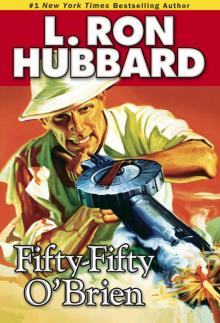 Fifty-Fifty O'Brien
Fifty-Fifty O'Brien Villainy Victorious
Villainy Victorious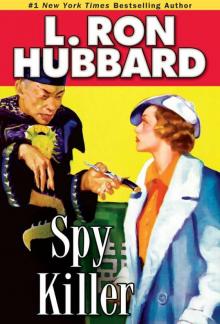 Spy Killer
Spy Killer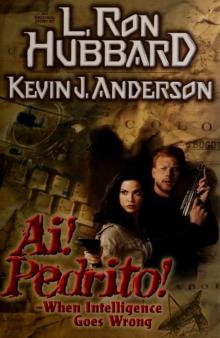 Ai! Pedrito!: When Intelligence Goes Wrong
Ai! Pedrito!: When Intelligence Goes Wrong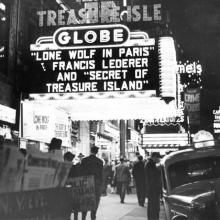 The Dangerous Dimension
The Dangerous Dimension Mission Earth Volume 1: The Invaders Plan
Mission Earth Volume 1: The Invaders Plan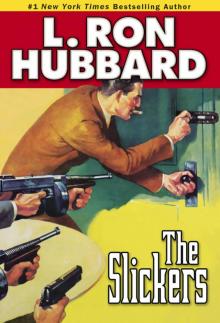 The Slickers
The Slickers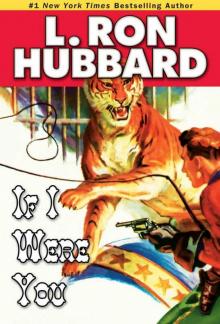 If I Were You
If I Were You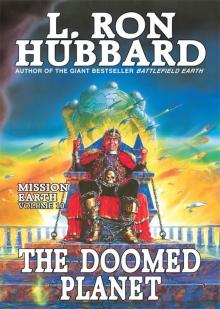 The Doomed Planet
The Doomed Planet Writers of the Future Volume 31
Writers of the Future Volume 31 Mission Earth Volume 2: Black Genesis
Mission Earth Volume 2: Black Genesis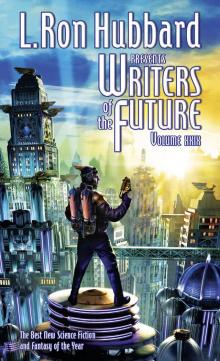 Writers of the Future: 29
Writers of the Future: 29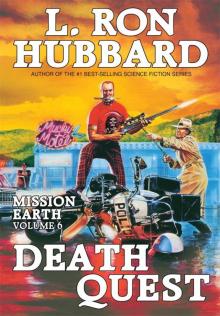 Death Quest
Death Quest The Enemy Within
The Enemy Within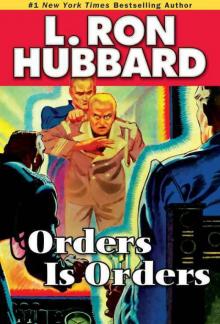 Orders Is Orders
Orders Is Orders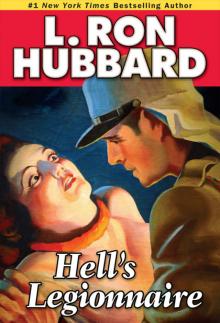 Hell's Legionnaire
Hell's Legionnaire L. Ron Hubbard Presents Writers of the Future 34
L. Ron Hubbard Presents Writers of the Future 34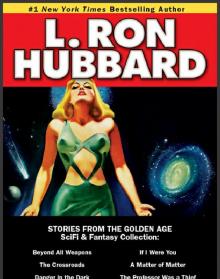 The Scifi & Fantasy Collection
The Scifi & Fantasy Collection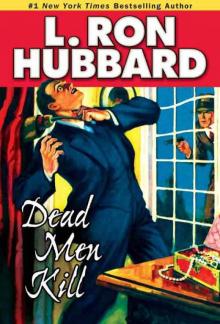 Dead Men Kill
Dead Men Kill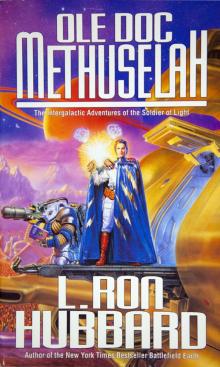 Ole Doc Methuselah: The Intergalactic Adventures of the Soldier of Light
Ole Doc Methuselah: The Intergalactic Adventures of the Soldier of Light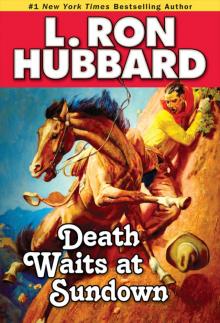 Shadows From Boot Hill
Shadows From Boot Hill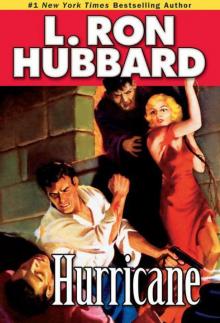 Hurricane
Hurricane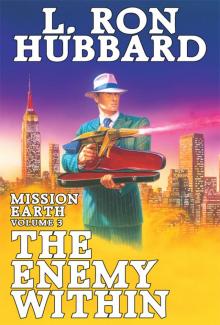 Mission Earth Volume 3: The Enemy Within
Mission Earth Volume 3: The Enemy Within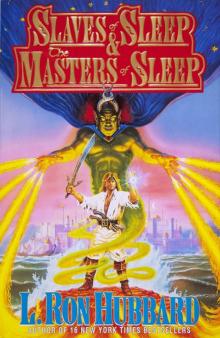 Slaves of Sleep & the Masters of Sleep
Slaves of Sleep & the Masters of Sleep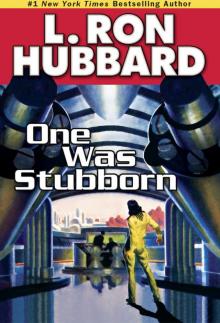 One Was Stubborn
One Was Stubborn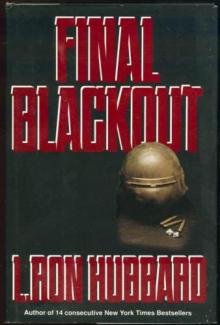 Final Blackout: A Futuristic War Novel
Final Blackout: A Futuristic War Novel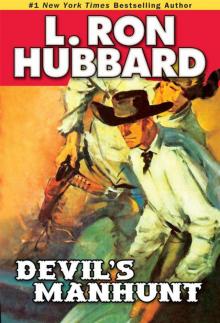 Devil's Manhunt
Devil's Manhunt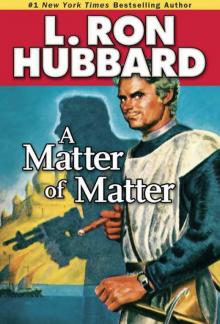 A Matter of Matter
A Matter of Matter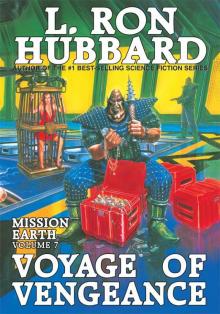 Voyage of Vengeance
Voyage of Vengeance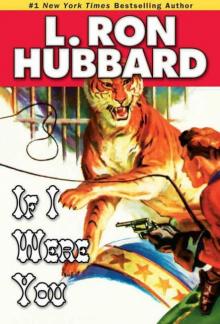 If I Were You (Science Fiction & Fantasy Short Stories Collection)
If I Were You (Science Fiction & Fantasy Short Stories Collection)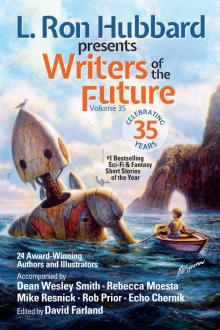 L. Ron Hubbard Presents Writers of the Future Volume 35
L. Ron Hubbard Presents Writers of the Future Volume 35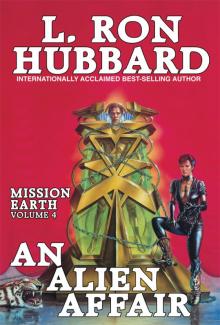 Mission Earth Volume 4: An Alien Affair
Mission Earth Volume 4: An Alien Affair Black Genesis
Black Genesis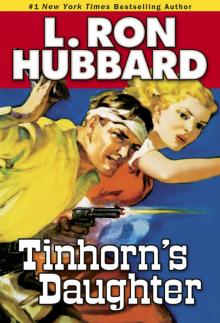 Tinhorn's Daughter
Tinhorn's Daughter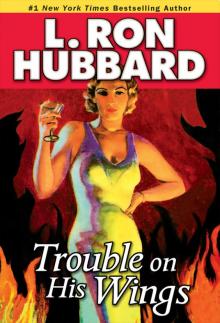 Trouble on His Wings
Trouble on His Wings Writers of the Future Volume 27: The Best New Science Fiction and Fantasy of the Year
Writers of the Future Volume 27: The Best New Science Fiction and Fantasy of the Year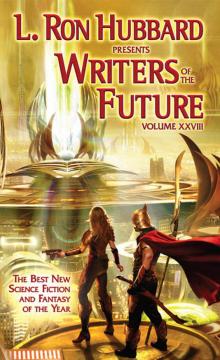 Writers of the Future Volume 28: The Best New Science Fiction and Fantasy of the Year
Writers of the Future Volume 28: The Best New Science Fiction and Fantasy of the Year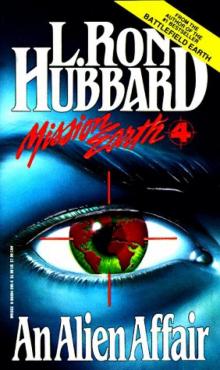 An Alien Affair
An Alien Affair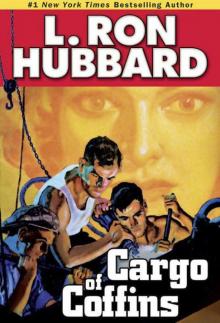 Cargo of Coffins
Cargo of Coffins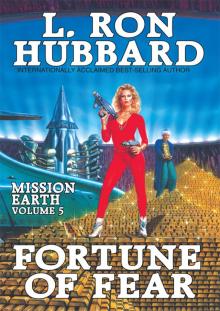 Mission Earth Volume 5: Fortune of Fear
Mission Earth Volume 5: Fortune of Fear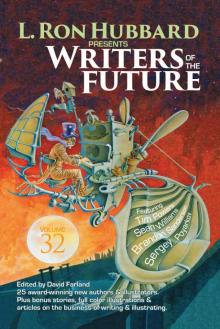 Writers of the Future 32 Science Fiction & Fantasy Anthology
Writers of the Future 32 Science Fiction & Fantasy Anthology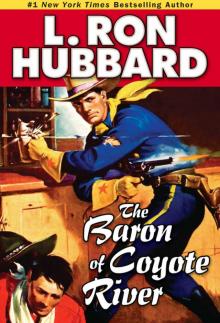 The Baron of Coyote River
The Baron of Coyote River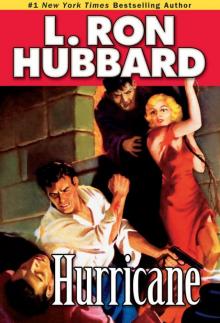 Hurricane (Stories From the Golden Age)
Hurricane (Stories From the Golden Age)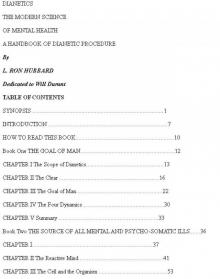 Dianetics: The Modern Science of Mental Health
Dianetics: The Modern Science of Mental Health Writers of the Future, Volume 30
Writers of the Future, Volume 30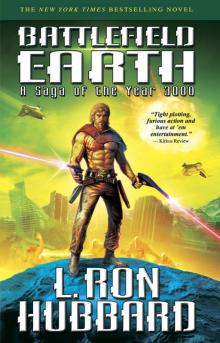 Battlefield Earth: A Saga of the Year 3000
Battlefield Earth: A Saga of the Year 3000 Fear
Fear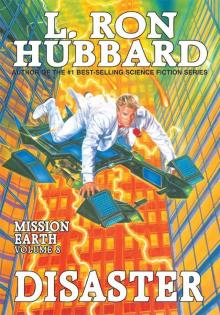 Disaster
Disaster Invaders Plan, The: Mission Earth Volume 1
Invaders Plan, The: Mission Earth Volume 1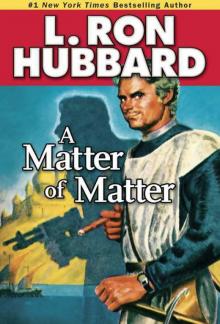 A Matter of Matter (Stories from the Golden Age)
A Matter of Matter (Stories from the Golden Age) Writers of the Future Volume 34
Writers of the Future Volume 34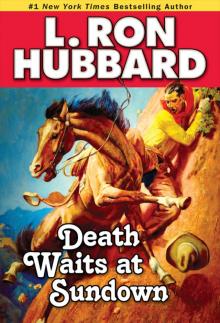 Death Waits at Sundown
Death Waits at Sundown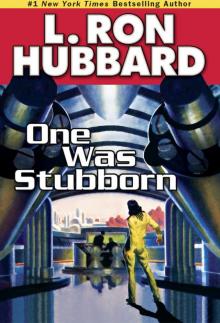 One Was Stubbron
One Was Stubbron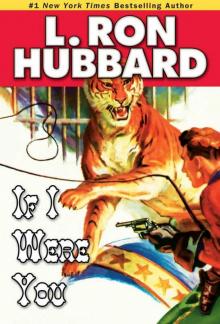 If I Were You (Stories from the Golden Age)
If I Were You (Stories from the Golden Age)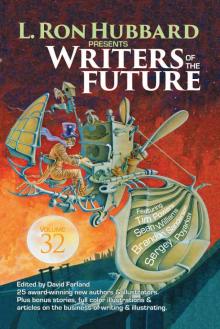 Writers of the Future 32 Science Fiction & Fantasy Anthology (L. Ron Hubbard Presents Writers of the Future)
Writers of the Future 32 Science Fiction & Fantasy Anthology (L. Ron Hubbard Presents Writers of the Future)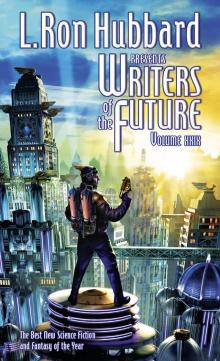 Writers of the Future, Volume 29
Writers of the Future, Volume 29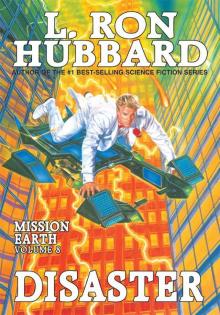 Mission Earth Volume 8: Disaster
Mission Earth Volume 8: Disaster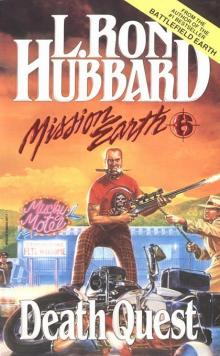 Mission Earth 6: Death Quest
Mission Earth 6: Death Quest Writers of the Future, Volume 27
Writers of the Future, Volume 27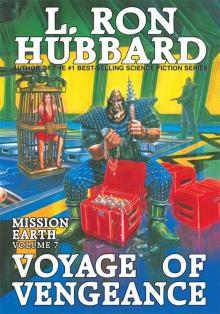 Mission Earth Volume 7: Voyage of Vengeance
Mission Earth Volume 7: Voyage of Vengeance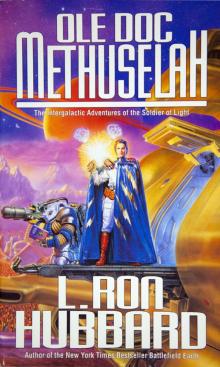 Ole Doc Methuselah
Ole Doc Methuselah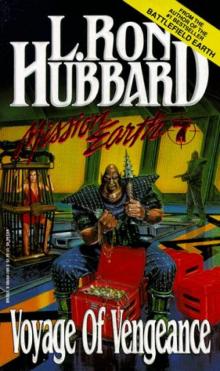 Mission Earth 07: Voyage of Vengeance
Mission Earth 07: Voyage of Vengeance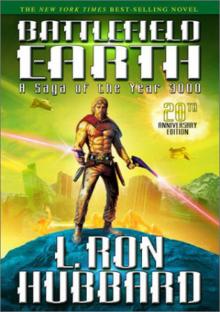 Battlefield Earth
Battlefield Earth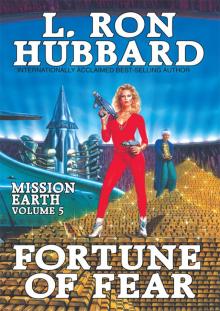 Fortune of Fear
Fortune of Fear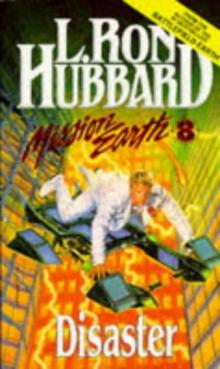 Mission Earth 8: Disaster
Mission Earth 8: Disaster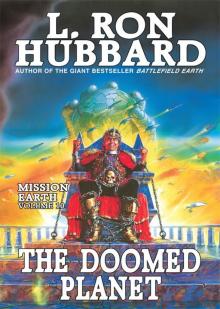 Mission Earth Volume 10: The Doomed Planet
Mission Earth Volume 10: The Doomed Planet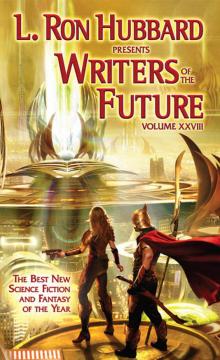 Writers of the Future, Volume 28
Writers of the Future, Volume 28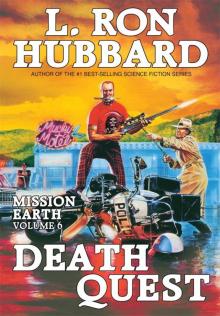 Mission Earth Volume 6: Death Quest
Mission Earth Volume 6: Death Quest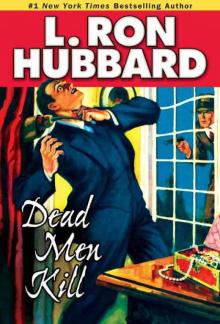 Dead Men Kill (Stories from the Golden Age)
Dead Men Kill (Stories from the Golden Age)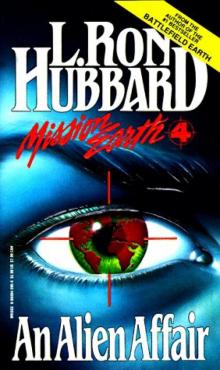 Mission Earth 4: An Alien Affair
Mission Earth 4: An Alien Affair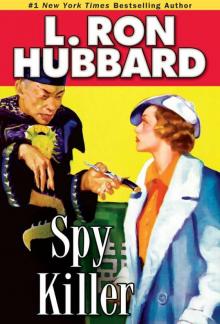 Spy Killer (Stories from the Golden Age)
Spy Killer (Stories from the Golden Age) Mission Earth Volume 9: Villainy Victorious
Mission Earth Volume 9: Villainy Victorious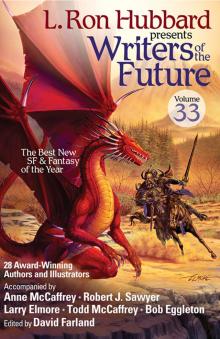 L. Ron Hubbard Presents Writers of the Future, Volume 33
L. Ron Hubbard Presents Writers of the Future, Volume 33